 There have been heated exchanges in the Canadian parliament this week over farts: indeed over usage of the mere word ‘fart’. How much – or little – has changed? Read more >>
There have been heated exchanges in the Canadian parliament this week over farts: indeed over usage of the mere word ‘fart’. How much – or little – has changed? Read more >>
News
Animating the Stuarts
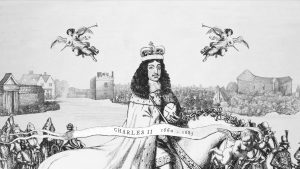 As we launch our ‘Stuarts in Seven Minutes’ animated film, it’s worth pausing to ask a few questions. Please have a look at the film and tell us what you think. And, to give you some background, here’s the ‘why’, ‘how’ and ‘what next’, from the Stuarts Online team. Read more >>
As we launch our ‘Stuarts in Seven Minutes’ animated film, it’s worth pausing to ask a few questions. Please have a look at the film and tell us what you think. And, to give you some background, here’s the ‘why’, ‘how’ and ‘what next’, from the Stuarts Online team. Read more >>
Notes from the author: Catriona Murray on Imaging Stuart Family Politics
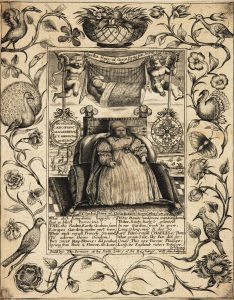 On 13 May 1629, Queen Henrietta Maria gave birth to a short-lived prince, who died within hours. Just over a year later, the prayers of both the queen and of her subjects were answered with the delivery of a healthy son, the future Charles II. His older brother, the first Prince Charles, was not forgotten, however. An engraving by William Marshall, produced to celebrate the birth of the surviving heir, depicts both Stuart babes. The living prince sits, chubby-faced, propped up on a bundle of cushions, arranged to resemble a throne. Read more >>
On 13 May 1629, Queen Henrietta Maria gave birth to a short-lived prince, who died within hours. Just over a year later, the prayers of both the queen and of her subjects were answered with the delivery of a healthy son, the future Charles II. His older brother, the first Prince Charles, was not forgotten, however. An engraving by William Marshall, produced to celebrate the birth of the surviving heir, depicts both Stuart babes. The living prince sits, chubby-faced, propped up on a bundle of cushions, arranged to resemble a throne. Read more >>
Notes from the author: Sasha Handley on Sleep in Early Modern England
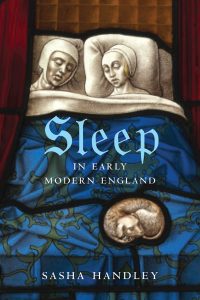 As humans, we spend almost one-third of our lives asleep. Sleep is a biological necessity that nobody can live without and so it is logical to assume that it is a natural impulse that has remained the same throughout history. As I began to read the work of sociologists and human geographers on this subject however, I was struck by how important our material and cultural worlds are in shaping sleep’s value, timing and quality. I was equally struck by how little notice historians have taken of this ubiquitous practice and so attempted to write a history of sleep that focused on its daily practice within English households from c.1650-c.1750. Read more >>
As humans, we spend almost one-third of our lives asleep. Sleep is a biological necessity that nobody can live without and so it is logical to assume that it is a natural impulse that has remained the same throughout history. As I began to read the work of sociologists and human geographers on this subject however, I was struck by how important our material and cultural worlds are in shaping sleep’s value, timing and quality. I was equally struck by how little notice historians have taken of this ubiquitous practice and so attempted to write a history of sleep that focused on its daily practice within English households from c.1650-c.1750. Read more >>
BBC Defoe Season: Defoe and the Stuarts
 BBC Radio 4 are currently running a series of programmes about the author Daniel Defoe, who is best known for his novels such as Robinson Crusoe (1719). But Defoe was also one of the most important political writers of the later Stuart period. Indeed, thinking about Defoe’s life and career helps us understand the political intrigues and events from his birth on the eve of Charles II’s restoration in 1660 to the death of Queen Anne in 1714. Read more >>
BBC Radio 4 are currently running a series of programmes about the author Daniel Defoe, who is best known for his novels such as Robinson Crusoe (1719). But Defoe was also one of the most important political writers of the later Stuart period. Indeed, thinking about Defoe’s life and career helps us understand the political intrigues and events from his birth on the eve of Charles II’s restoration in 1660 to the death of Queen Anne in 1714. Read more >>
Some thoughts on a Hamlet production
 I saw a production of Hamlet by Shakespeare at the Tobacco Factory in Exeter last week. Actually it was routine stuff, with no particular vision or agenda, but any production of this play will make the audience think. This piece – more a reflection on the play than a review of the production – picks up on two things that were in my mind during the performance. Read more >>
I saw a production of Hamlet by Shakespeare at the Tobacco Factory in Exeter last week. Actually it was routine stuff, with no particular vision or agenda, but any production of this play will make the audience think. This piece – more a reflection on the play than a review of the production – picks up on two things that were in my mind during the performance. Read more >>
Conference: Connecting Centre and Locality: Political Communication in England, c. 1550–1750
 The Huntington Library, San Marino, 20-21 May 2015
The Huntington Library, San Marino, 20-21 May 2015
This conference explores the dynamics of local, national, and trans-Atlantic political culture with particular reference to political communication. Experts in the field will survey how connections were forged between politics in London and politics in the localities.
In Our Time: Titus Oates and His Popish Plot
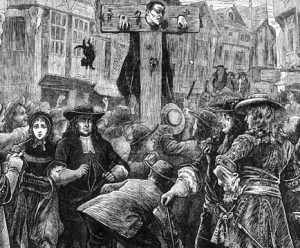 Melvyn Bragg’s excellent BBC Radio 4 discussion programme In Our Time concentrates this week on Titus Oates and the Popish Plot. The programme features Mark Knights, Clare Jackson, and Peter Hinds discussing Oates and his scheme. It is well worth listening to, especially if you are studying or interested in the Exclusion Crisis or the Stuart period more generally. You can find the programme online here.
Melvyn Bragg’s excellent BBC Radio 4 discussion programme In Our Time concentrates this week on Titus Oates and the Popish Plot. The programme features Mark Knights, Clare Jackson, and Peter Hinds discussing Oates and his scheme. It is well worth listening to, especially if you are studying or interested in the Exclusion Crisis or the Stuart period more generally. You can find the programme online here.
Monarchy and Power in the Stuart Age: A Study Day for Secondary School History Teachers
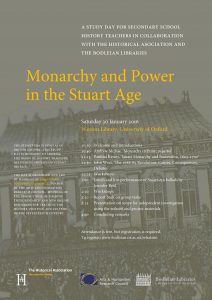
The Stuart era is pivotal in British history. Spanning the years 1603 to 1714, it included the greatest British civil war, two revolutions, and eventually the founding of Great Britain itself. It was also a period of intense cultural and intellectual development: Shakespeare was a Stuart for half of his working life; others to shape this century include Milton, Hobbes, Locke and Behn. Read more >>
Stuart Successions Database
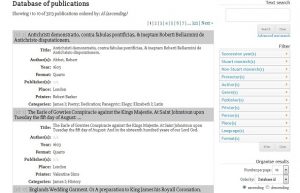 The Stuart Successions Database is the central, open-access output from a four-year research project funded by the Arts and Humanities Research Council. Led by researchers from the universities of Exeter and Oxford, The Stuart Successions Project aimed to identify and interpret the wealth of material published in response to each of the six Stuart successions: i.e. those of James VI and I (1603), Charles I (1625), Charles II (1660), James II (1685), William III and Mary II (1688-89), and Anne (1702). In the interests of establishing a more complete picture of the period, the project also covered the accessions to the role of Lord Protector of Oliver Cromwell (1653) and his son Richard (1658). Read more >>
The Stuart Successions Database is the central, open-access output from a four-year research project funded by the Arts and Humanities Research Council. Led by researchers from the universities of Exeter and Oxford, The Stuart Successions Project aimed to identify and interpret the wealth of material published in response to each of the six Stuart successions: i.e. those of James VI and I (1603), Charles I (1625), Charles II (1660), James II (1685), William III and Mary II (1688-89), and Anne (1702). In the interests of establishing a more complete picture of the period, the project also covered the accessions to the role of Lord Protector of Oliver Cromwell (1653) and his son Richard (1658). Read more >>
Royal Memos: From Charles I to Charles III
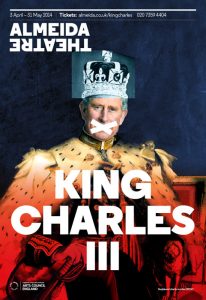
Mike Bartlett’s recent play King Charles III, nominated for six Olivier awards, opens and concludes with a royal succession. The plot is a prophecy about Prince Charles’ future kingship, in which Charles uses dormant royal powers to stop Parliament passing legislation he disagrees with, and so sparks a revolution. Revolution is probably not at stake in today’s Supreme Court decision to release the real Prince Charles’ ‘black spider memos‘. But these letters will bring the Prince’s political leanings under scrutiny. Read more >>



